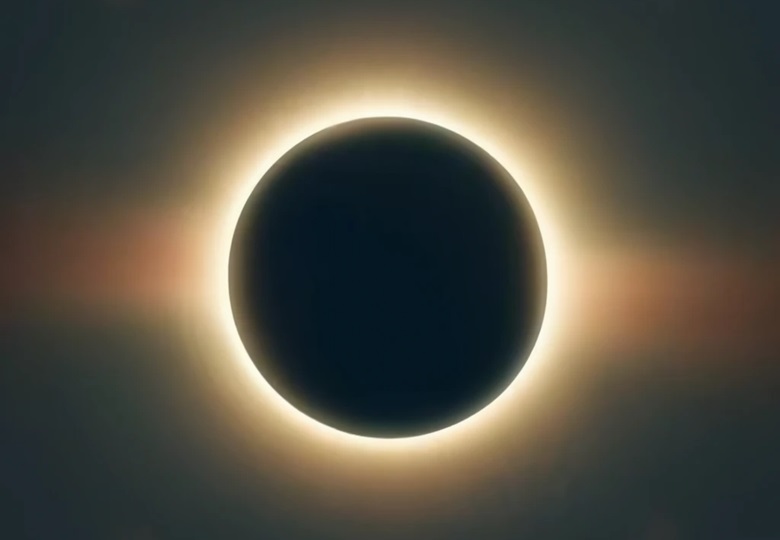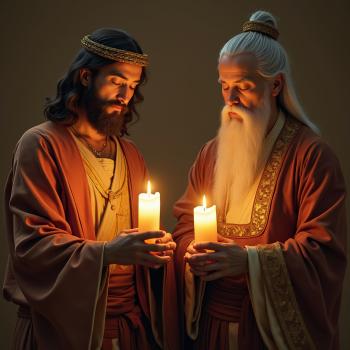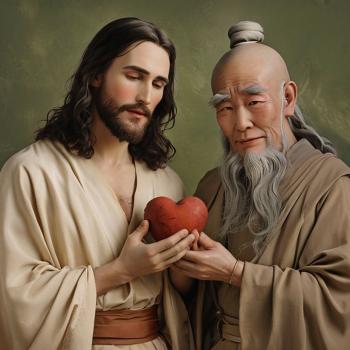How do you describe Ultimate Reality? Judaism called it YHWH. Jesus translated this as “Ego Eimi.” Lao Tzu called it the Tao, or “The Way.”

Christians often view God incorrectly as an old grandfather in the sky. It’s no wonder—throughout Church history, artists depicted God in this way. When pressed, believers often admit that God is ultimately indescribable. But an indescribable God is hard to wrap your head around. Jews, Christians, and Taoists Jesus and the Chinese philosopher Lao Tzu (Laozi) shared much in common. One common denominator was their attempt to describe the indescribable. Here’s how Lao Tzu put it in the Tao Te Ching, Taoism’s most sacred text:
Tao Te Ching – Verse 1
J.H. McDonald Translation
The tao that can be described
is not the eternal Tao.
The name that can be spoken
is not the eternal Name.
The nameless is the boundary of Heaven and Earth.
The named is the mother of creation.
Freed from desire, you can see the hidden mystery.
By having desire, you can only see what is visibly real.
Yet mystery and reality
emerge from the same source.
This source is called darkness.
Darkness born from darkness.
The beginning of all understanding.
Lost in Translation
The opening lines of the Tao Te Ching remind the Christian reader of words that echo back to the beginning. Genesis says that in the beginning, Earth was formless and void. No word had yet been spoken. No differentiation was yet made. That void, formless and dark, was the womb of nascent creation. It was in that unspoken essence that the Eternal can be understood in its most pure form. Yet, at some point, long after the first words were spoken, we decided we must call it something. So, we called it by the many names of God. Yet, by our naming, something got lost in the translation.
I AM Who I AM
For Jewish believers, the pronounceable name of God is not the eternal God. When Moses asked who he should say was sending him to Pharoah, the burning bush answered, “I AM WHO I AM.” Christians often mistakenly assume I Am is the name of God. Likewise, Jews fall into error when they claim that the name of God is Yahweh, YHWH, or Jehovah. All these names miss the point. The answer spoken from the bush was not so much a name as it was an evasive definition of the divine: “I am what I am. I am Existence Itself. Every bit of everything is wrapped up in Me. Don’t try to name Me. Only try to know Me—the unnamable and the eternally real.” And even all that misses the mark of identifying the Infinite.
Logos and Tao
The American Bible Society did something similar in their 1911 edition of the Canton New Testament, in which they translated “Logos” as “Tao.” Here is their rendering of John 1:1-5, 10, 14a:
In the beginning was the Tao,
And the Tao was with God,
And the Tao was God
The same was in the beginning with God.
All things were made by Him;
And without Him was not anything made that was made.
In Him was life, and the life was the light of men.
And the light shines in darkness,
And the darkness comprehended it not….
He was in the world, and the world was made by Him,
And the world knew Him not….
And the Tao became flesh,
And dwelt among us,
And we beheld His glory….
These Bible translators understood that for the Chinese people the closest word to “Logos” was “Tao.” Yet, for many Christians, this doesn’t feel right. If this seems awkward to you, don’t worry. It’s a good thing if you are uncomfortable with Christ being called the Tao. Hold onto that discomfort—because the Tao that can be named is not the eternal Tao. To name Jesus of Nazareth as the eternal Tao would be too small a thing to describe Tao. Terms like God and Holy Spirit fall short. Yet, words are what we have. The key is to remember that once we name Tao, it slips through our fingers. This is why the Hebrew tradition wisely refuses to name the Sublime.
Naming: Mother of Creation & Disillusionment
“Let there be light!” said the Word—and the undifferentiated became manifest reality. “Let there be darkness. Let there be beaches and clouds and oceans and fish and birds and crocodiles and mosquitoes and grass and trees.” Naming was the origin of all particular things. Naming became the mother of all creation. With the fabrication of physicality, desire came into the world. Suddenly they were animals to be named, a spouse to be loved, a tree to be avoided, and an Apple TV to be watched. There was a nakedness to be ashamed of, a bush to hide behind, a snake to blame. Yes, in the parable of the Fall, we see the disillusion of our relationship with ultimate reality, broken by our fixation on the world of particular things.
Distracted by the World of Manifestations
Even now, we find ourselves distracted by the world of manifestations. From the moment we awake, there are teeth to be brushed, breakfast to be eaten, car keys to grab, and wallet not to leave on the kitchen table. “By having desire,” says the Tao Te Ching, “you can only see what is visibly real.” Desiring to be at work on time, you rush out of the house without having enjoyed the aroma and taste of the coffee you inhaled. You distract yourself with the world of particular things without making yourself aware of the realm of spirit.
Some Greek philosophers and early Christians believed that the world of things was evil, while the word world of spirit was good. Taoism reminds us that “mystery and reality arise from the same source.” Since all things spring from the I AM, the Tao, the Essence of All Being, they cannot be called evil. But we must understand these particularities for what they are: children of divine love.
The Eternal Womb
The Tao Te Ching describes the eternal womb as “darkness born from darkness, the beginning of all understanding.” All too often, Christianity teaches that darkness is the equivalent of evil. But the darkness of the earth-womb knows no malevolence. Before the light was spoken, before divine children were sung into being, this darkness was the gateway to all understanding.
Taoism calls this darkness Yin. We see it represented by the black portions of the Yin-Yang symbol of Taoism. Yin represents the darkness of the womb, the void before creation, the mind at peace, and the closing of the eyes. It is receptivity and femininity. When we lack understanding, we simply need to return to the Tao. Re-enter the womb. Embrace the divine “mother of all understanding” like comforting arms in the darkness of night. Quit chasing after the world of particular things. Stop trying to find meaning in manifestations. Instead of trying to find answers, travel back to your Source and embrace the mystery.
Something to Ponder
Do you like good mystery novels? What makes reading a mystery so great? There’s something amazing about not knowing. Of course, in most mysteries, everything is explained in the end. But faith isn’t a mystery novel. Not everything gets explained. In fact, faith is about embracing the mystery—the unknowable.
The apostle Paul writes, “Now faith is the substance of things hoped for, the evidence of things not seen.” Faith is trusting what you can’t see. This is the essence of the teachings of both Jesus and Lao Tzu. Faith isn’t so much about having the right answers, as much as asking the right questions. Does your faith have unanswered questions? Instead of feeling disappointed, try accepting and enjoying the mystery.














